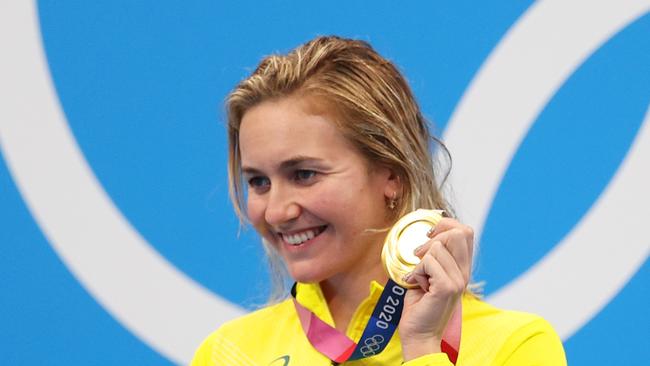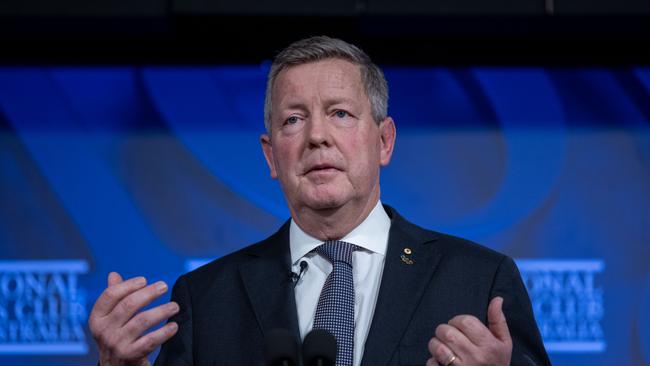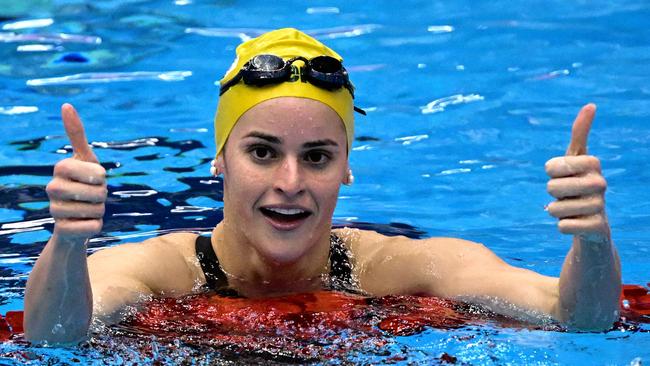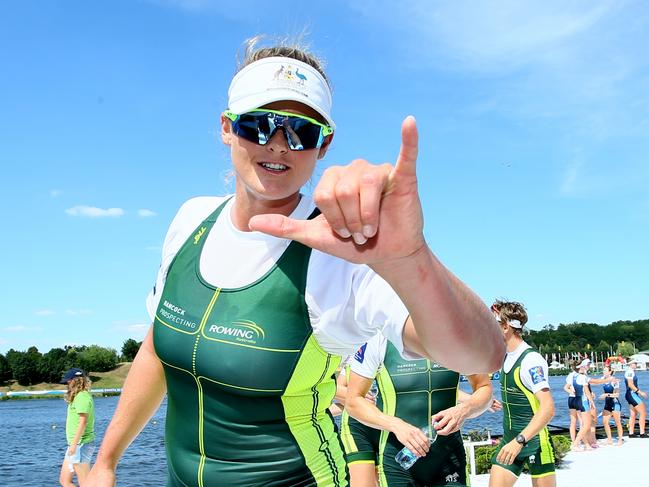Paris Olympics 2024: Gold medal winning swimmers’ calls for Athletes village ban to be reversed fall on deaf ears from AOC
‘Rip off’, ‘unfair and unkind’, ‘makes me mad’ – after chafing privately since the Olympic Village ban by the AOC was announced, Australia’s golden stars are now speaking out.
Olympics
Don't miss out on the headlines from Olympics. Followed categories will be added to My News.
Taught to never give up whenever they are representing their country at the biggest sporting event in the world, Australia’s exasperated Olympians have vowed to keep fighting the one battle they have been told they cannot win.
First privately, but now publicly, some of Australia’s top medal hopefuls for this year’s Paris Olympics are speaking out against a divisive new ruling which will prevent them from staying on in the Athletes’ Village once their events are finished.
The Australian Olympic Committee (AOC), which approved the controversial rule change, said its hands were tied because there were not enough beds in the village for the entire team and it was also unfair on anyone still competing to be disrupted by other athletes partying.
But some athletes, and sporting bodies, disagree with the reasoning and are asking for a rethink.

Swimming superstar Ariarne Titmus, who lifted the nation’s spirits during the Covid-19 lockdown with her inspiring wins at the last Olympics in Tokyo, summed up the deep frustration among many Paris hopefuls when she told this masthead: “I’m pretty riled about this.
“After you’ve worked so hard to go to the Olympics, to be removed from that entire environment as soon as you finish.
“I just think that it’s a bit of a rip off.
“I completely understand the reasoning behind it that you want every Olympic athlete in the Australian team to have the best possible chance to perform the best they can.
“But not having Australian athletes in the Village isn’t going to remove the noise or the partying from every other athlete in the village from around the world.
“The Australian swim team are the major medal winners for our country. We don’t get to go to the opening ceremony because we’re racing the first day. Now we don’t get to the closing. We literally miss out on our Olympic experience other than racing.”
Whether they win or lose, Australian competitors have always regarded their free time in the Athletes’ village as a small reward for all their years of hard training because it is the one chance they get to let their hair down and support any teammates still competing.
But that won’t be happening in Paris after the AOC executive decided last year that Aussie competitors would have to vacate the Village 48 hours after their last event.
The International Olympic Committee told this masthead it was up to each country to decide who gets their allocation of beds, which have been reduced from a total of 17,000 to 14,500.
It’s understood some countries are adopting the same approach as the AOC while others will let their athletes stay for the duration. The United States, which almost always tops the medals tally, said it had not decided yet what it will do.
The AOC insists its decision was carefully thought through and approved by the Athletes’ Commission, which includes past and present Olympians.

AOC chief executive Matt Carroll said any affected athletes would be permitted to return for the Closing Ceremony, but would have to find their own accommodation in between and also buy their own tickets to any events they wanted to watch teammates compete in because there were no free tickets available anymore.
“It was a decision for very good reasons as we’ve already said. Whilst we appreciate the swimmers and their enthusiasm and so forth, that was made for decision, not just for the swimming team, but all the other athletes too who are at the Games,” Carroll said.
“We only have 474 beds in the village but to look after the sports and so forth we need 567. So we need people to come and go.
“So there’s that aspect of it, the village is smaller. The other aspect is the high performance one, which we’ve always said so that we can ensure that the athletes coming in the second week have the same support services that we provide to the athletes in the first week.”
A lot of competitors are still not convinced, particularly the swimmers, who invariably win the bulk of Australia’s medals.
At the 2021 Olympics in Tokyo, the entire Australian team won a total of 46 medals, including 17 gold – 14 in the first week, three in the second.
The swimmers contributed 21 medals, including nine golds. They competed in the first week then were sent home because of the pandemic rules in place at the time.
Backstoker Kaylee McKeown, who captured three gold medals in Japan and is tipped to win more in Paris, said Covid was not a valid reason anymore and the ruling was causing problems for athletes and their families who were struggling to find alternative accommodation in the French capital.

She said her mother had made a booking only to lose it when the owner reneged and “jacked up the price two grand.”
“It does make me mad. It makes a lot of athletes mad because we got that taken away from us because of a reason. And now there’s not really that Covid reason anymore.
“Just let us experience an Olympic Games.”
World champion middle distance freestyler Elijah Winnington called on the AOC to reconsider the policy change, saying it’s not too late.
“I can tell you right now, I don’t know one athlete that is supporting it,” Winnington said.
“We’re not trying to stay back so we can run amok, we want to support our other teammates.
“We are trying to fight this but unfortunately, it’s a very stern no.
It’s a huge disappointment but hopefully we can still sort something out.”
It’s not just the swimmers who are venting their anger.
Champion rower Georgie Rowe, a member of the Australian women’s eight, said the ruling was tough for Olympic athletes struggling to make ends meet.
“It’s just not fair, it’s not very nice. What are they expecting us to do because we don’t have a lot of money and accommodation in Paris is really expensive,” Rowe said.
“At the end of the day, we’re there to train and race and do our best and it just feels like you’re then spat out onto the street, like, ‘okay, here’s your entertainment, now move on.”

Some national sporting bodies – speaking anonymously because they fear repercussions from the AOC – have also told this masthead they believe the AOC needs to come up with a better solution for the athletes.
With the start of the Paris Olympics just over six months away, but with the vast majority of competitors still unsure if they will be selected, the issue is becoming a major headache for sports that are already operating under tight budgets and staff restraints because it is creating an extra layer of organisational and operational planning.
The AOC maintains its decision is final but athletes say they will keep fighting it, with some even offering to sign waiver forms to abide by any additional rules or curfews just so they can experience village life.
“The high performance lens is the most important thing we learnt from Tokyo and that it made a lot of difference to the sports in the second week,” Carroll said.
“We appreciate their offer of wanting to sign things and that but they already have a team agreement right but it’s for those high performance reasons and the change in the capacity of the Olympic Village.”





